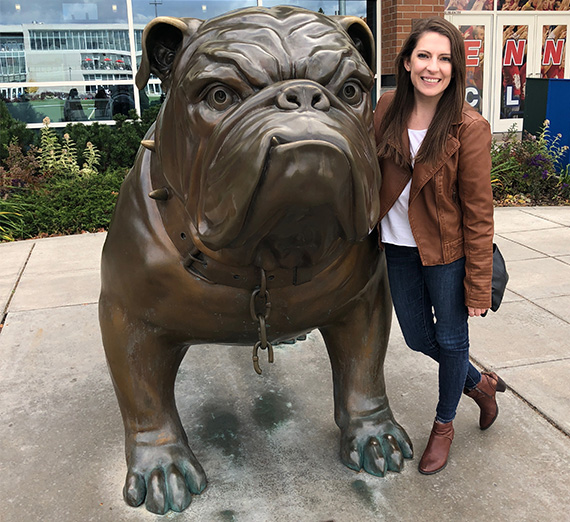It’s Graduation – Now What?

As a fairly recent graduate now on staff as Gonzaga's social media specialist I have the opportunity to mentor to students facing their own graduation. Here's some advice I share with them - and others having those senior-year fears and questions.
“Did you have a job right after college?”
My two senior social media students stood at the doorway of my office in mid-March. We were chatting as we typically do each week about how school and life were going for them. The closer we get to graduation, the more we inevitably talk about moving on to the “real world.”
This is the first academic year during my employment at Gonzaga that I’ve worked with seniors so closely. The opportunity to help guide them even in a small way through the process of moving on, reaching out to contacts for informational interviews, and just being there to listen has been one of the most rewarding and unexpected parts of my job this year.
Here is what I told them and what I tell any student: “No, I did not have it all figured out. At all.”
This was my path, what worked for me, and what I recommend.
Leverage your contacts
My senior year, I was fortunate to have a parent who has worked in communications in the greater San Diego area for over twenty years. Heading into Christmas break my senior year I was able to connect with some of his contacts for informational interviews. The one meeting that couldn’t get scheduled until the summer was with the person with whom I would end up interning and for whose company I would then work for three years after graduation.
I encourage my students to connect with anyone in the Marketing and Communications office. I love having students come my way to ask me about what I do and how I got here. Are we busy? Yes. Are we Zags? Yes. That means we want to help the students at our University succeed. It is surprising how infrequently students ask to come by and chat with folks here. Be willing to reach out and learn.
Be aware of the resources available to you. At Gonzaga, the Career and Professional Development Office has mock interviews, etiquette dinners, low cost business card printing and more.
Live at home and embrace the grace period
Heading into second semester of my senior year I had no idea what I was going to do after graduation. I was your average overly involved GU student who was dreading graduation. I told myself to finish school strong. I didn’t feel like I had the money or connections to move to Seattle as other Zags were planning. I decided to focus on school and have a great senior year, knowing I could move home and figure something out then. Not everyone has a great family situation. Not everyone happens to be from an incredible city. But if you do, consider taking a beat. Save money by staying with family. Pay off your student loans as much as you can. Many programs give you a six-month grace period before you need to start paying your loans. Use that time to get your ducks in a row and set yourself up for a better financial future. You can give yourself a deadline of when you want to be moved out, but if you can, consider giving yourself the gift of time. I lived at home for two and a half years and cherished the extra time spent with my parents especially as I moved to another state six months later.
Be willing to work for free
If you still get to be on your parents’ health insurance, that is one less thing to worry about with finding a job. This may give you the freedom to take an unpaid internship or to freelance. The current market is filled with online working opportunities to help you get your feet wet in your given field, especially with marketing and communications. Once you hit 26, you need to make sure you are covered with health insurance but, right after school, you may be able to be more flexible.
Know you can do anything for a year
This was the mantra of many seniors while I was in school. It is even more relevant for younger generations. While there is incredible value in staying at an organization you value long term and growing there, it may take a while to find your best fit. You first job doesn’t have to be your forever job.
Keep learning
Learn what you want to know. Education doesn’t end after class or after commencement. If you want to learn about social media or some other area of expertise but you didn’t have the chance to take a class on it, seek out information. Look up speakers at major conferences and consume their content. Search for YouTube videos for the information you want to learn. The ability to seek out your passion is at your fingertips. Some companies offer professional development opportunities and may fund continued learning for employees.
Visit Gonzaga's Career & Professional Development office for more great tips.
